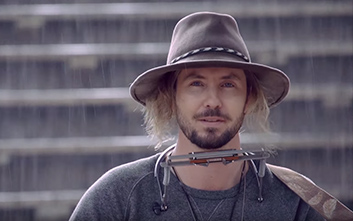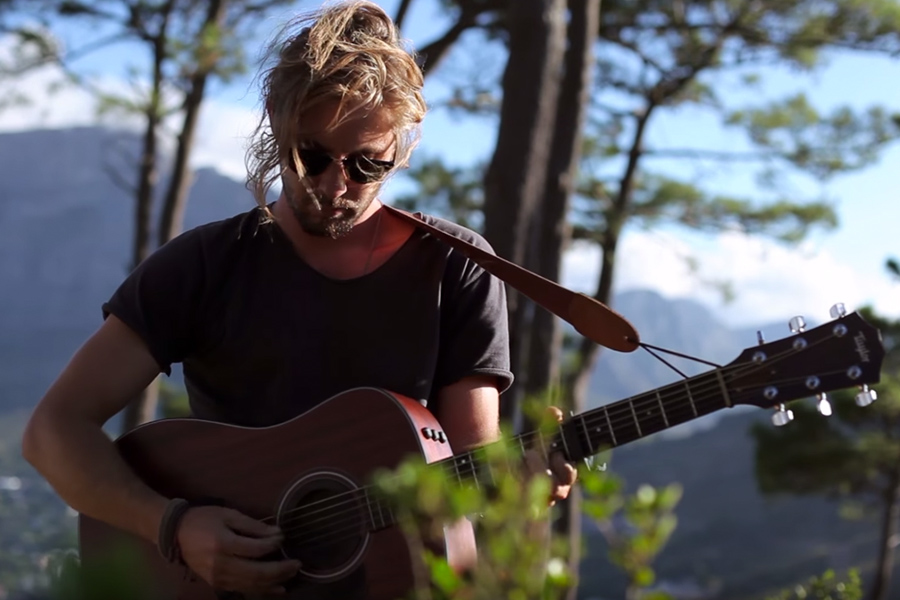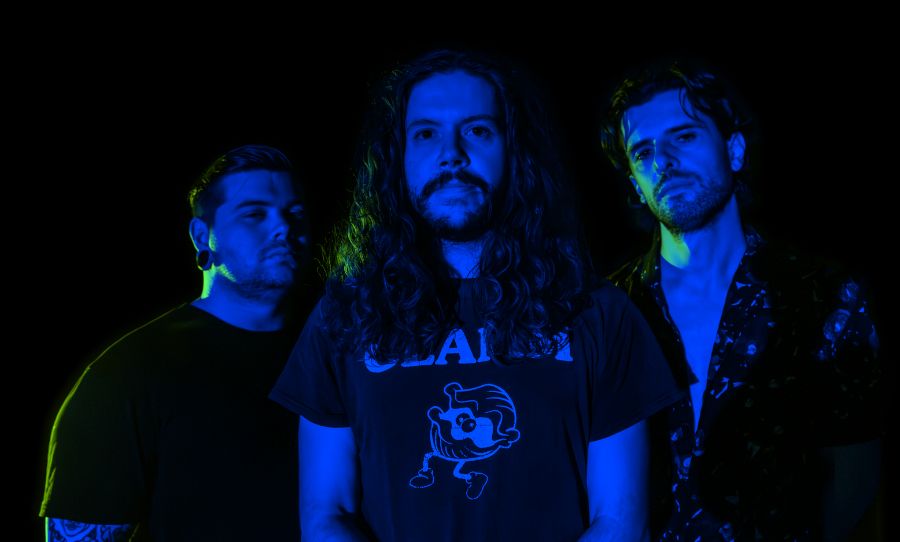Some things are bigger than one country or its borders. And those things include music, surfing and trees; three things which are close to the heart of South African artist Jeremy Loops. About to embark on his international tour, Loops will be bringing his roots inspired music, and his surfboard to Australia for the first time this November.
In a lucky twist of fate, Loops shares his name with one of his most important pieces of kit, his loop pedal. Actually, we were a bit sad to find out that his real name is Jeremy Hewitt, and the name ‘Loops’ didn’t quite originate from his musical style. We caught up with him about his debut album, Trading Change, environmentalism and, of course, loop stations…
When Jeremy Loops found himself working on a yacht with no choice but to form a one man band, he took up his trusty pedal and his brand new name.
HAPPY: To start off, a pretty big tree blew over outside my house and apparently now is a good time to clear it up. So if you can hear any weird noises, or drilling… sorry, that’s what that is.
JEREMY: That’s ok, that happens. Sounds like there’s a woodpecker on the phone…
HAPPY: Not quite, it’s a massive pneumatic drill. But anyway! You’re about to start your international tour?
JEREMY: I fly off the day after tomorrow. I’m still in Cape Town, South Africa, right now.
HAPPY: You’ll be hitting up Europe and then you’ll be playing shows here in Australia in November?
JEREMY: Correct! It’s my first time [in Australia], I can’t wait. All my friends have been, I grew up in a little surf town so I know all about the waves there. It’s a beautiful thing to be able to come down there for my music and get to do it all.
HAPPY: So you’ll be trying to fit some surfing in as well then?
JEREMY: Definitely, it’s on the cards. I’ve got a lot friends who went out, settled down and never came home, so I’m looking forward to seeing a bunch of old mates I haven’t seen in years as well.
HAPPY: I imagine you’ll be playing material off your album, Trading Change. It’s tricky to place you in one genre, but there’s a lot of folk and roots in there, what are your main influences when you write?
JEREMY: I think my main influence definitely comes from a folk background. I listened to a lot of Bob Dylan and Woody Guthrie, and that kind of thing in my earlier, guitar learning years. I toured with a guy from Australia, Xavier Rudd, and generally that rootsy music is definitely part of our culture and the kind of of surf community that I’m from. You know, that outdoorsy, laid-back, country, bluesy, rootsy, surfing vibes… Just kind of how I grew up.
HAPPY: Your music is pretty uplifting as well, which I guess fits with that surf life style. Even lower tracks like Basil are still pretty feel-good?
JEREMY: Yeah, I think I write music to fulfil a functional purpose in my life. I’m not the guy who listens to overly depressing music when I’m in a bad mood. I think a lot of the time I write music like that to deal, or to cope with my life and some of the stresses and anxieties that I have. Yeah, that’s probably why.
HAPPY: You really got into your writing while you were working on a yacht in the Mediterranean, do you think that had something to do with it as well? I reckon I’d be writing pretty happy music if I was doing that.
JEREMY: Yeah, I had a great time doing that. I travelled a lot, got to see so much of the world. And I made a lot of new friends out there, so those were good times. But I was very conflicted while I was out there, because I knew I didn’t want to be working on yachts forever, and I was planning my escape! Trying to figure out what the next step was. There was a lot of internal conflict and I think I had a lot of source material to work with.
And the social context, you know? I was between the age of 24 and 26, when all my friends back home were living it up and having the best time ever. Although I was having an amazing time and really seeing a lot, I had no social life to speak of. That was actually kind of a blessing in disguise because it left me with every night, no responsibilities to anyone else, to just make music and do my thing.
HAPPY: So you had a lot of time from introspection, and for autonomy?
JEREMY: Autonomy, yeah you need it! And time… time is the one thing we all have equal and unfortunately the most difficult thing to keep track of. I definitely feel that even when I’m at home now, I feel responsible to see all my friends, there’s parties and if you’re not at social things you feel like you might be missing out. There was a certain tranquility out there [on the yacht] which I don’t think is easy to find.
HAPPY: I’m a little bit sad that your name isn’t really Jeremy Loops, I’m guessing it’s actually a nod to the loop pedals you use in your writing and performance?
JEREMY: When I was at university I had a nickname “Loopholes” because I was the kid who as always finding those loopholes. When I left to go yachting I realised I wasn’t going to have a band or be able to play in one, and I was just getting to the level of proficiency where I thought I might be good enough , so that was quite a difficult thing to deal with.
I was like “Shit, if I can’t be in a band what’s the solution?”. Searching for loopholes I suppose! I found this loop pedal which allowed me to be my own band and layer lots of things up without having to rely on other people. It was the perfect thing for me, a loophole in itself. I was very chuffed with that, I bought the biggest and best loop pedal I could find, packed it in my bag and off I went, in search of adventure with my one man band.
HAPPY: What loop pedal do you use?
JEREMY: I’ve actually been using the same loop pedal for years now, it’s a Boss RC50. I wasn’t a fan of the most up-to-date one so I reverted back to the one I like the most, the RC50. But so many different companies are making loop pedals nowadays.
HAPPY: What is it about the RC50 that you just can’t move away from?
JEREMY: I think it’s maybe a bit of habitual stuff? I got so used to looping on it, and it’s kind of a tap-dance thing that I do. If you ever see me live, during each song I probably smack the pedal maybe fifty or sixty times with my feet. When I got their new pedal and they’d moved a bunch of the pedals around, it didn’t feel intuitive to me. I think what I really need is for someone to come and make me a custom pedal.
HAPPY: We can do a shout out here – any one want to build Jeremy a custom loop station?!
JEREMY: Yes, thank you.
HAPPY: Going back to your album, it was released last year but it wasn’t available to stream until 2016. Partly because Spotify didn’t launch in South Africa until then. Do you think that SA is sometimes overlooked by the global music culture? I’m definitely thinking about Searching For Sugar Man, like when he had no idea he was so famous there.
JEREMY: Yeah, definitely – most developing nations have quite thriving music cultures in certain spaces. Maybe not quite as broadly as most first world countries, but certainly there’s beautiful stuff happening all around the world which is often over looked by the mass media. It just can’t quite break through the noise.
HAPPY: You also co-founded a greening social enterprise, Greenpop. Are you still involved in that?
JEREMY: It’s been two years now since I laid down my hat as the CFO. I studied a business degree at university and so I fell into the roles of fun officer, and I did a lot of benefit concerts and fundraisers for trees. Then I was CFO on the side, so I managed the accounts and the finances, all that stuff.
It was very intense trying to wear both those hats, to be an up and coming musician in South Africa and the Financial Officer of a company. But it was obviously my project with two very good friends of mine, and we were very passionate about it. I was extraordinarily happy to hand that role over two years ago when everything in my musical career started taking off beyond my control.
Now I’m much more on the PR side of things and the brand building. I’m able to reach so many more people with my platform now that I’m touring the world and finding all these new homes for my music in new places. We’re doing really well, we’ve planted nearly seventy thousand trees in six years.
HAPPY: That’s pretty amazing!
JEREMY: We’ve got a staff of around thirty people, and we’ve planted trees in over 350 different schools and beneficiaries around South Africa. So we are ploughing our way ahead!
HAPPY: How much does your environmentalism feed into your music?
JEREMY: It definitely is there, Killer Killer is a song written about my time in Zambia and the terrible deforestation crisis the country faces. And Basil is about a homeless man but it also speaks to so much more than that. One of things I found – because I started Greenpop before I started my music – is recognising the way that people respond to things.
I was very aware of wanting to not ever preach overtly in my music, or put stuff in there which is a turn off to some listeners. When I hear a band and they sing a song which does sound preachy, it often doesn’t really hit me. I sometimes just blank off a bit. Sometimes it’s about subtlety.
HAPPY: Environmental protest music is comparatively rare, do you think protest records work given what you’ve just said?
JEREMY: It’s so difficult to say. If you look at the Leornardo Di Caprio’s or the Bono’s of the world, a lot of their core following… I wouldn’t say reject their attempts at humanitarianism, but it definitely doesn’t resonate that strongly with everyone. Some people take it seriously, and others think it’s a PR stunt and it’s just a celebrity trying to be something else.
It’s so easy to be misconstrued, and I’m still trying to figure that out to be honest. I haven’t come to a conclusion but I do know that I sometimes have that same feeling of maybe a slight repulsion when I see a celebrity taking too hard a tone? Part of me wants to celebrate that they’re speaking out, and another part of me is a little bit more “Is this a PR stunt? Are they doing this for self gain, do they actually care?”
HAPPY: People also seem to want humanitarian efforts to be completely perfect, utopian solutions. Which is pretty much impossible?
JEREMY: Absolutely! Just yesterday I put up a poster across my social media channels, I went to go pick up two new surfboards I had made and it was a collaboration between one of our biggest surf shops in South Africa and Hemporium, who are a company that bring in organic hemp products. We basically made two eco surfboards, because I wanted to add a couple of boards to my quiver and I wanted to see if we could make them a little bit closer being environmentally friendly.
Obviously, surfboards are made out of such toxic materials, it’s a bit of strange thing with surfers all being so natural and close the ocean, and mother nature, but riding on these toxic polystyrene and resin, non-biodegradable board. So I tried to do it with my short boards, and we still needed to use the polystyrene foam to shape the board but instead of using fibreglass cloth to wrap the board we replaced that with hemp cloth.
Instead of using resin to seal the board we used this stuff called Super Sap. It’s a really new product in the surf world and it’s actually made from tree sap. When you see a tree bleeding sap, it’s essentially that, an up-cycled product from the paper industry, from when they mash the pulp. It hardens just the same as a resin does but it’s vegetable based and totally biodegradable.
I was so proud of these two boards, I put them up and most people were stoked but then there are a few people who are hassling about the fact that they are still polystyrene foam. People aren’t just happy that you’re making ten steps forward, they’re happy to stay with the status quo until it’s perfect. And cheaper! And sometimes that’s not possible, environmentalism doesn’t always make sense economically and people don’t always respond that well to that.
HAPPY: Have you found the same thing in music? Do you ever get frustrated that you won’t be able to please everyone?
JEREMY: I haven’t got enough experience in the industry to really answer that. I’m only one record in and so far it’s been a bit of a dream situation. Our live show has always been a really strong component of what we do, and we just grow audiences really quickly. On the music front I’m feeling pretty locked in and like we’re nailing it for the people who are part of it.
When it comes to record two, I think I’ll be more likely to face that criticism if I start playing some electric guitar, or get too far away from what people would expect.
HAPPY: What can Australian audiences look forward to at your shows?
JEREMY: I’ll be travelling a five piece band. I’ve got a rapper, a saxophonist, a drummer and a bassist, and a lot of looping coming from me in the middle of it all. Up tempo, high energy madness! A lot of back and forth sing along, I use a lot of instances during the set to loop the crowd into my loop pedal and actually bring them into the songs live. I think it’s going to be a lot of that.




